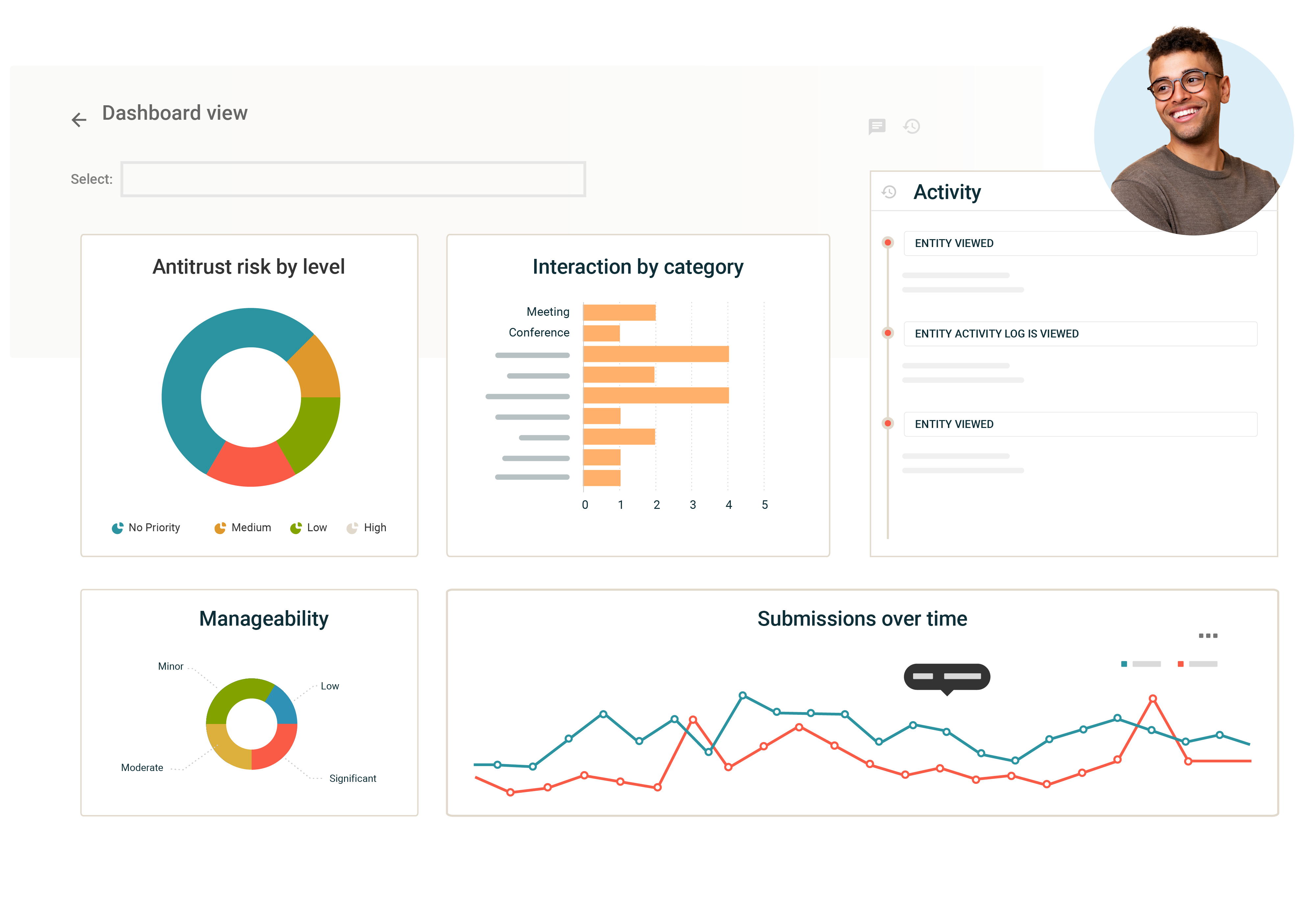Pharmaceutical
Pharmaceuticals compliance software
Benefit from an integrated, data-driven approach to managing corporate compliance, ethics, and third-party risk – trusted by leading pharmaceutical companies worldwide. With less effort and more reach, you finally get a better way to do your good work.

Trusted by the world’s leading pharmaceutical companies
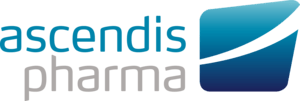
Why leading pharmaceutical companies rely on GAN Integrity
GAN Integrity is how compliance teams at pharmaceutical companies get the tools and expertise to stay ahead of risk. With less effort and more reach, you finally get a better way to do your good work.
See everything – Gain a comprehensive view of overall risk and compliance in one centralized platform for more effective program management.
Adapt to anything – Leverage dynamic workflows and integrations to stay ahead of regulatory changes and evolving program requirements, all without heavy lifting or expense.
Get all the help you need – Receive dedicated support from GAN Integrity’s team of experts.
Compliance challenges for the pharmaceutical industry

As a compliance professional in the pharmaceuticals industry, it can feel like you're up against an unfair fight. You face a myriad of regulations from agencies such as the Food and Drug Administration (FDA), the European Medicines Agency (EMA), and laws like the Health Insurance Portability and Accountability Act (HIPAA). Key areas of focus include drug safety, data privacy, and supply chain transparency. New regulations, such as the German Supply Chain Act (LKsG) and the Corporate Sustainability Due Diligence Directive (CSDDD or CS3D), extend compliance obligations to include third parties and suppliers.
You must ensure your organization builds a strong ethical culture and acts with integrity in all business dealings. This involves implementing robust compliance policies and training programs, managing conflicts of interest, gifts, and disclosures—especially in interactions with pharmacies, healthcare providers, and government entities.
Key areas of compliance in pharmaceuticals
Pharmaceutical companies are complex enterprises. There are many areas of compliance, ethics, and risk that need to be managed, spanning everything from Environmental, Social and Governance (ESG), to Data Protection to Anti-Bribery And Corruption (ABAC). These include:
- ABAC Compliance: Upholding anti-bribery and anti-corruption (ABAC) laws such as the Foreign Corrupt Practices Act (FCPA) and the UK Bribery Act.
- Drug Safety and Quality: Ensuring all products meet safety and quality standards in compliance with regulations like FDA and EMA.
- Clinical Trials Compliance: Ensuring adherence to regulations governing clinical trials, including patient consent and data privacy.
- Data Protection: Safeguarding sensitive information and ensuring compliance with data privacy regulations such as HIPAA.
- Supply Chain Transparency: Ensuring suppliers and partners comply with relevant laws and standards and maintaining visibility into the entire supply chain.
- Ethical Sourcing: Implementing ethical practices in sourcing and production to meet consumer and regulatory expectations.
- Regulatory Submissions and Reporting: Complying with regulatory submissions and reporting requirements for product approvals.
- Environmental Compliance: Minimizing the environmental impact of operations.
- Labor Laws: Observing fair employment practices and labor standards.
- Intellectual Property Protection: Protecting patents, trademarks, and copyrights.
Steps to achieving compliance in the pharmaceutical industry
Achieving compliance in any organization involves a series of strategic steps:
Compliance in the Pharmaceutical Industry
Risk Assessment
Identify potential compliance risks specific to your pharmaceutical operations.
Objective Setting
Define clear compliance goals that align with your operational objectives.
Documentation
Maintain thorough records of compliance efforts and decisions.
Training
Educate employees about compliance requirements tailored to the pharmaceutical industry.
Monitoring and Auditing
Regularly review compliance status and adjust practices as needed.
Reporting System
Establish clear channels for reporting issues and disclosures.
Issue Response
Quickly address non-compliance issues to prevent disruptions.
Continuous Improvement
Regularly update compliance practices to stay ahead of regulatory changes.
GAN Integrity for Pharmaceutical Companies
GAN Integrity helps pharmaceutical companies navigate these challenges with a unified, easy-to-use compliance platform that organizes requirements, automates tasks, and provides powerful reporting, making it easier for you to do your good work. With GAN Integrity, compliance teams can see everything, adapt to anything, and get all the help they need.
ABAC Program Management
Ensure your organization upholds ethical integrity and ABAC compliance through comprehensive risk assessments, effective policy management, and continuous monitoring. Capabilities include:
- Third-party due diligence: Mitigate bribery and corruption risks with integrated questionnaires, sanctions checks, and risk intelligence data.
- Disclosure management: Consolidate and assess conflicts of interest, gifts, travel, entertainment, and political and charitable contribution disclosures.
- Reporting and documentation: Maintain a complete audit trail and detailed reporting to easily demonstrate compliance to stakeholders and regulators.
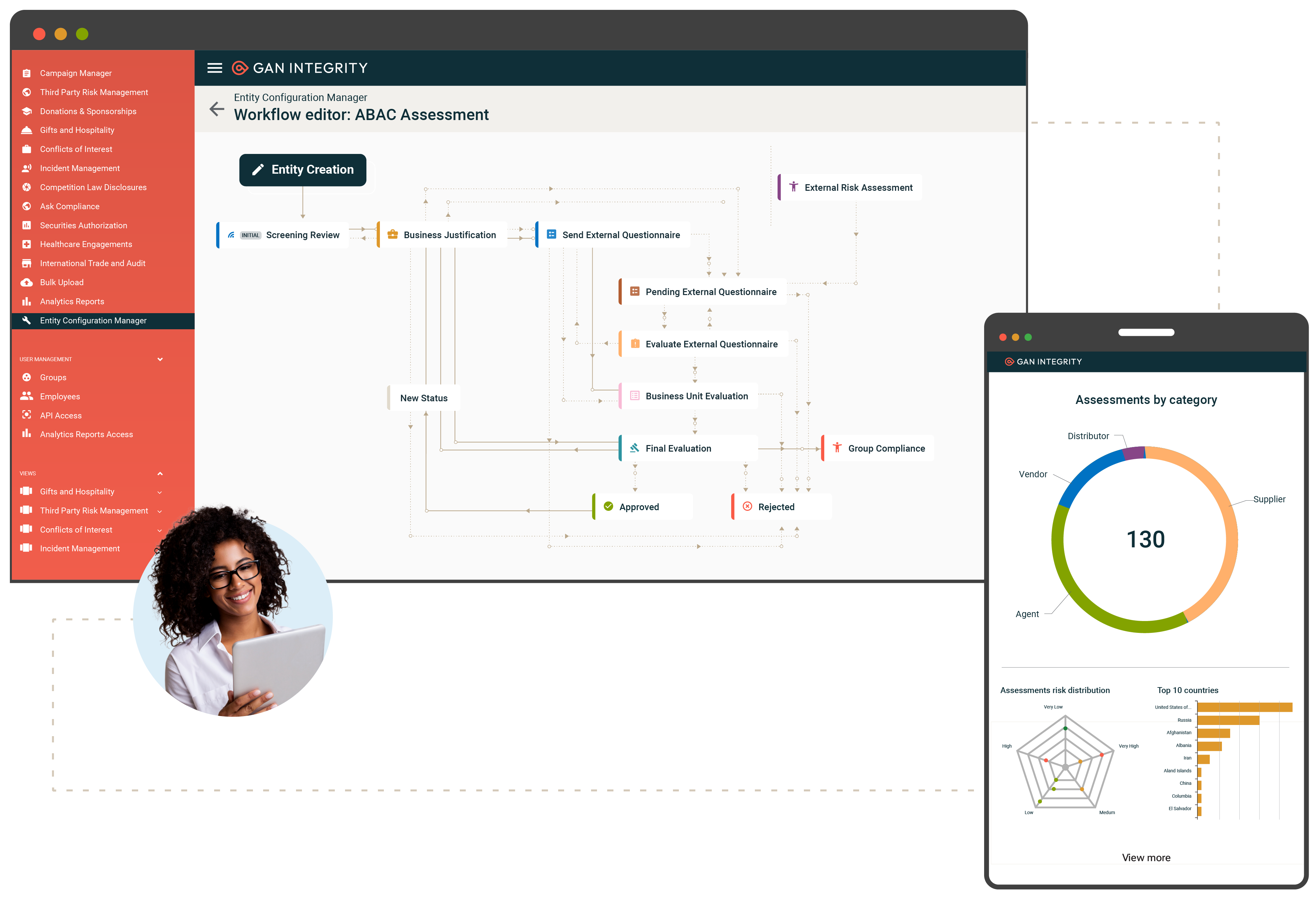
Third-Party Risk Management
Manage risks associated with third parties and assess these against relevant laws and organizational standards. Capabilities include:
- Lifecycle management: Automated workflows for onboarding, risk assessment, issue management, monitoring and off-boarding.
- Integrated due diligence: Initial and ongoing screening of third parties for sanctions, adverse media, forced labor, ESG and more.
- Reporting and analytics: Executive dashboards and reports: Consolidate third party data to identify risks and potential exposure to your organization.
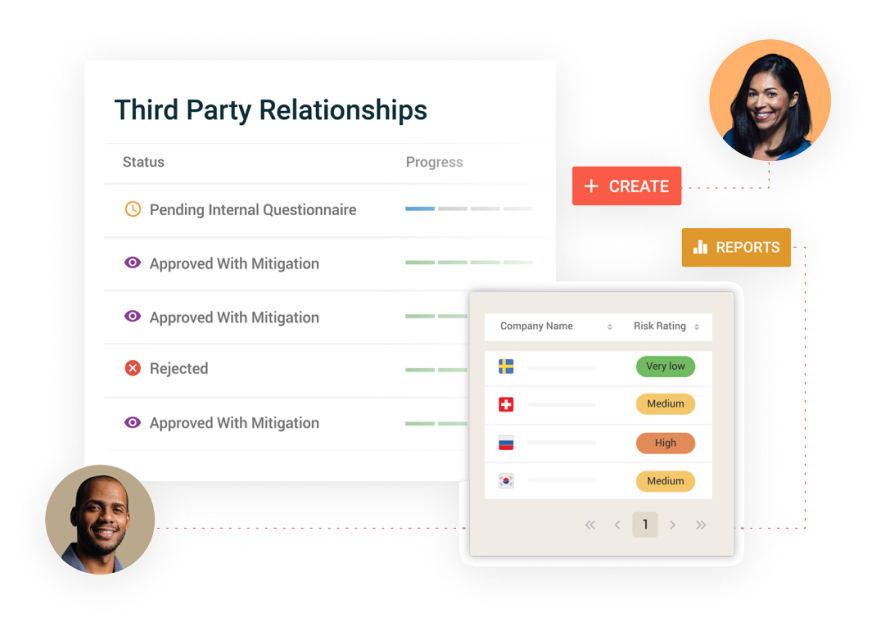
Gifts and Entertainment
Manage Gifts and Entertainment disclosures with an easy to use, configurable platform. Capabilities include:
- Flexible processes: Adapt disclosure intake forms and workflows to your business processes.
- Campaign management: Set up campaigns to inform and engage employees in your disclosure program.
- Third-party risk integration: Track gifts and entertainment disclosures against third parties and suppliers for a holistic view of risk
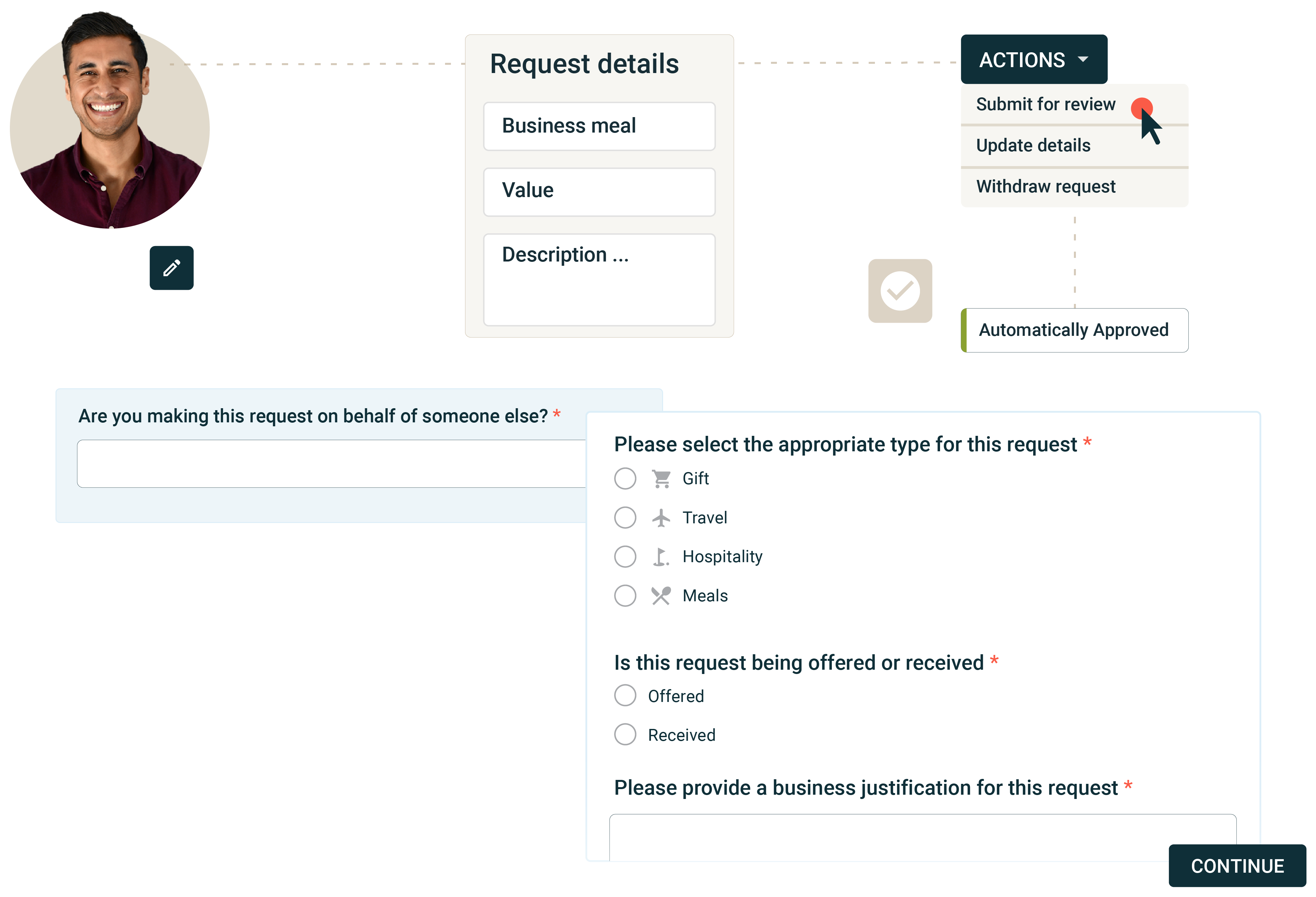
Disclosure Management
Consolidate your disclosures for conflicts of interest, gifts, travel, entertainment, and political and charitable donations or contributions. Capabilities include:
- Policy management: Develop and enforce comprehensive disclosure policies. Educate and engage your workforce with targeted training and policy attestations.
- Flexible disclosure process: Simplify the submission of potential conflicts of interest with user-friendly forms, ensuring easy access for employees.
- Automated approvals and reviews: Enhance compliance with automated approval and review workflows. Quickly escalate notifications to relevant stakeholders to address potential risks.
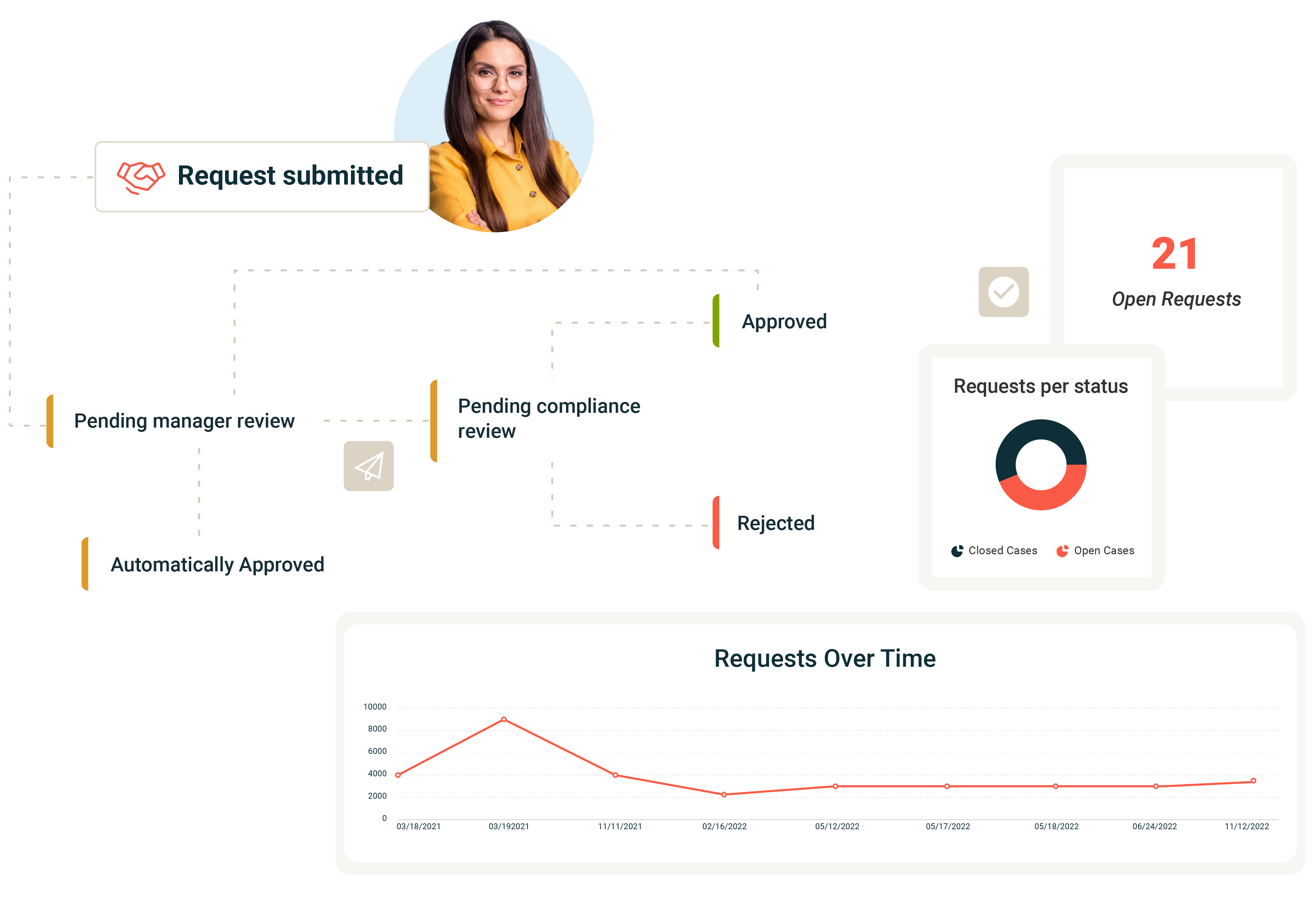
Reporting and Documentation
See everything across your compliance program, and generate reports and dashboards to demonstrate compliance program effectiveness to stakeholders and evidence to regulators. Capabilities include:
- Reporting and analytics: Executive, role-based dashboards to review the effectiveness of your compliance program initiatives.
- Evidence-based compliance: Maintain an auditable trail of all activity with the platform’s integrated and automated audit log.
- Compliance insights: See risk trends and patterns within your program, including third-party and supply chain risk, policies and disclosures.
